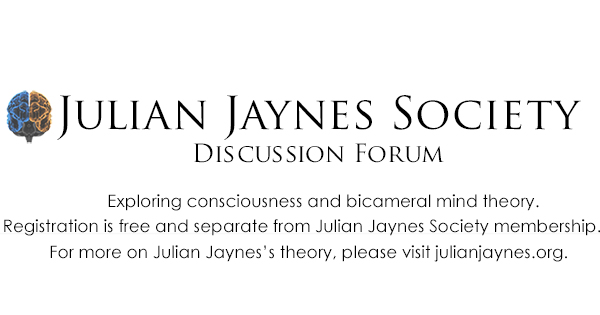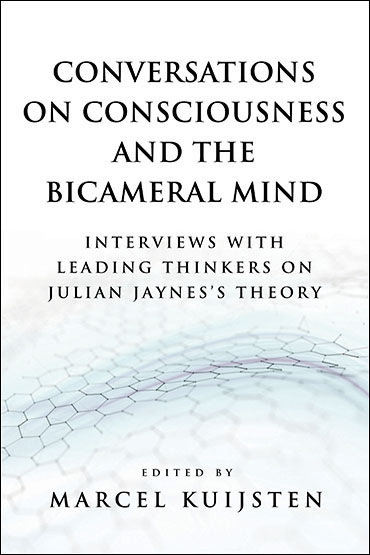Imagine you’re out at a restaurant and someone you have just met has heard about Jaynes but admits they never read anything about him. He asks “Could you explain his theory in a few words?” You grab a napkin, take out your pen, and write down the following two statements and note that the arrow (-->) means shapes, impacts, or configures, while the equal sign (=) denotes results in or becomes:
(1) evolution --> gross neuroanatomical changes = behavior-governing hallucinations
(2) sociodemographic changes --> hallucinations rendered obsolete = consciousness
The first statement describes how powerful imagistic experiences attributed to external entities developed as a side-effect of language. Eventually, they were interpreted as supernatural visitations and socially managed burgeoning populations (demographic growth was probably a consequence of the agricultural revolution but the actual story may be more complex).
The second statement indicates how the success of agriculturally-driven urbanization and further demographic expansion outpaced the control mechanism of hallucinations. Individuals had to upgrade their mentality by learning via language consciousness in order to navigate social complexity.
Though hallucinations have lost their role in social management, they still make an appearance. And since they are a sort of default feature of our neurology, neurological imaging should still discern their functioning.
At this point, if your acquaintance hasn’t left yet, grab another napkin and explain consciousness. You explain that of three statements, only one corresponds to Jaynes argument. The other two are wrong:
(1) evolution --> gross neuroanatomical changes = consciousness
(2) culture --> gross neuroanatomical changes = consciousness
(3) culture --> unremarkable neuroanatomical changes = consciousness
The first, adopted by not a few, including neuroscientists, philosophers, and assorted researchers, is an intuitive folk psychological theory—consciousness is something universal and automatic in operation that it must have been evolutionarily baked into the human brain.
As for the second one. This describes what some who have read but misinterpreted Jaynes come to believe: Culture caused major neurological changes.
You point out that the third statement is an accurate rendering of Jaynesian theory: Culture configures neurological processes in such a way that consciousness emerges, in the same way people might acquire ideas about religion or politics. Consciousness, as historically profound and influential as it is, is a set of beliefs. “Unremarkable” means imperceptible or that nothing conspicuous shows up in neurological imaging (though eventually technological advances may change this).
You explain that in the present context “culture” is tantamount to learning or acquiring knowledge through language. And since consciousness has not altered our neurology, it must be learned anew with each generation.
Finally, you stress that consciousness means subjective introspectable self-awareness, not perception, cognition, thinking, memory, etc.
Jaynes on a Napkin
Posts by anthropologist, mental health counselor, and author Brian J. McVeigh on Julian Jaynes's theory and related topics.
Return to “Brian J. McVeigh's Random Thoughts”
Jump to
- JJS Forum
- ↳ General Discussion
- ↳ News Items Related to Jaynes's Theory
- ↳ Book Discussion: The Origin of Consciousness and Julian Jaynes Society Publications
- ↳ Myths, Misconceptions, and Fact Checks About Julian Jaynes's Theory
- ↳ Brian J. McVeigh's Random Thoughts
- ↳ Julian Jaynes
- ↳ Conferences, Events, and Local Discussion Groups
- ↳ Lecture Discussion
- ↳ Interview and Q&A Discussion
- ↳ 1.0. Hypothesis One: Consciousness Based On Language
- ↳ 1.01. Hypothesis One: Consciousness Based On Language | Subtopic: Consciousness & Dreams
- ↳ 1.02. Hypothesis One: Consciousness Based On Language | Subtopic: Consciousness in Children
- ↳ 1.03. Hypothesis One: Consciousness Based On Language | Subtopic: Consciousness and AI
- ↳ 2.0. Hypothesis Two: The Bicameral Mind
- ↳ 2.1. Hypothesis Two: The Bicameral Mind | Subtopic: Auditory Hallucinations in Normal Adults
- ↳ 2.2. Hypothesis Two: The Bicameral Mind | Subtopic: Hallucinations & Imaginary Companions in Children
- ↳ 2.3. Hypothesis Two: The Bicameral Mind | Subtopic: Hypnosis, Possession & Altered States of Consciousness
- ↳ 2.4. Hypothesis Two: The Bicameral Mind | Subtopic: Religion & the Bicameral Mind
- ↳ 2.5. Hypothesis Two: The Bicameral Mind | Subtopic: Schizophrenia
- ↳ 2.6. Hypothesis Two: The Bicameral Mind | Subtopic: The Mentality of Pre-Literate & Pre-Modern Peoples
- ↳ 3.0. Hypothesis Three: Dating the Development of Consciousness
- ↳ 4.0. Hypothesis Four: Jaynes's Neurological Model for the Bicameral Mind
- ↳ The Bicameral Mind in Fiction, Film & Popular Culture
- ↳ Information for Students


